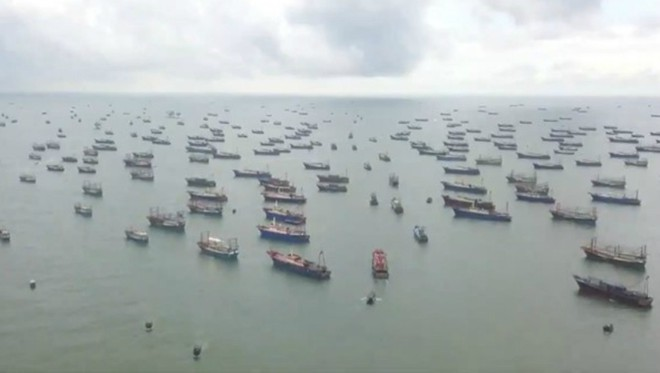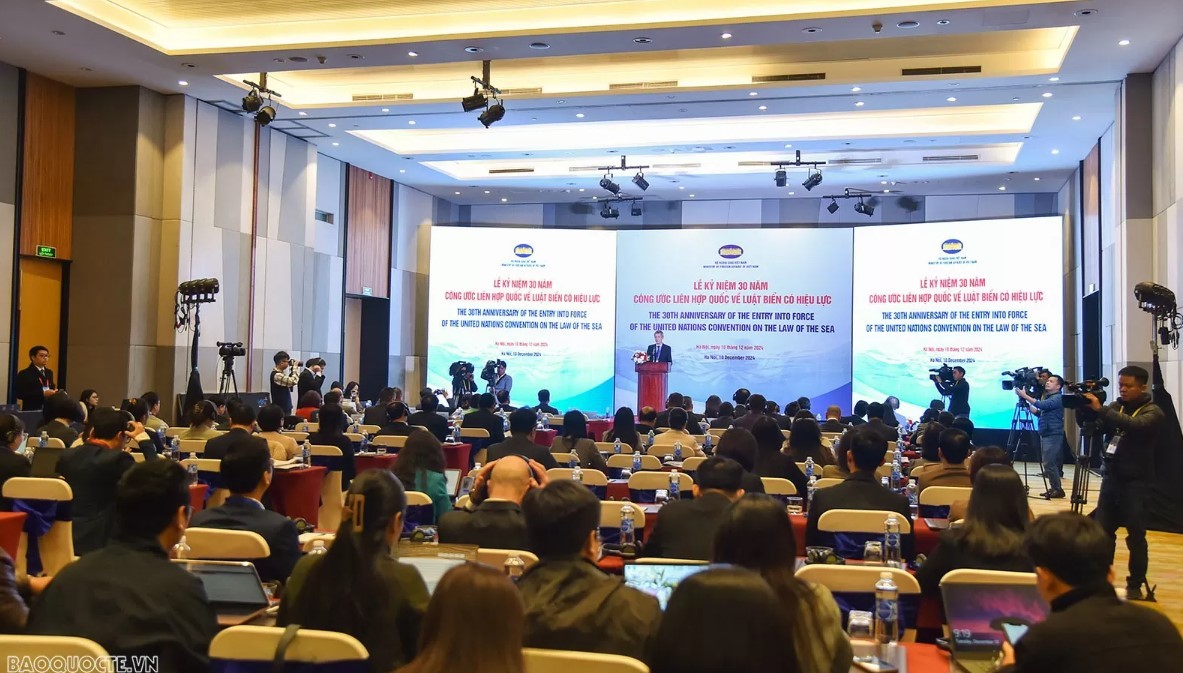China's responses to France-UK-Germany joint UN note against its claims in Bien Dong Sea
 |
| The British Navy warship HMS Argyll took part in exercises with the US Navy in the South China Sea in January 2019. (Photo: US Navy) |
On September 18, China submitted a note to the United Nations in response to the joint note verbale of three European powers which expressed their opposition to China’s expansive claims in the Bien Dong Sea (internationally called South China Sea).
China: Go against international laws
In their note, the three European countries stressed that "the universal and unified character of UNCLOS that sets out the legal framework within which all activities in the oceans and seas must be carried out".
Meanwhile, China argued, "UNCLOS does not cover everything about the maritime order". The country also stated that "Paragraph 8 of the preamble of UNCLOS emphasizes that “matters not regulated by this Convention continue to be governed by the rules and principles of general international law” - a statement that its Deputy Foreign Minister used at the international conference on "The South China Sea from the perspective of cooperation" held on Hainan Island on September 2, Vietnamnet cited.
In fact, UNCLOS is a maritime charter, covering general provisions for all maritime zones and areas of marine activity. UNCLOS and the conventions established on the basis of UNCLOS create a bundled solution, requiring consistency in interpretation and application and no specific exceptions.
The China's note affirms that China has territorial sovereignty and maritime rights established in a long history and has the consistency of successive governments, in accordance with international law including both the United Nations Charter and UNCLOS.
However, its 1980 White Paper states that Chinese fishermen were the earliest to discover, name, and manage the islands in the South China Sea. This goes against international law, which stipulates that only peaceful and continuous acts of occupation by the government bring in the title of sovereignty.
Historically, Chinese governments have recognized the southernmost point of Chinese territory as Hainan Island. It was not until 1909 that China had a new dispute over the Paracel Islands. The use of force at Hoang Sa (Paracel) in 1974 and Truong Sa (Spratly) in 1988 was not a measure to create a title of sovereignty confirmed by the UN Charter.
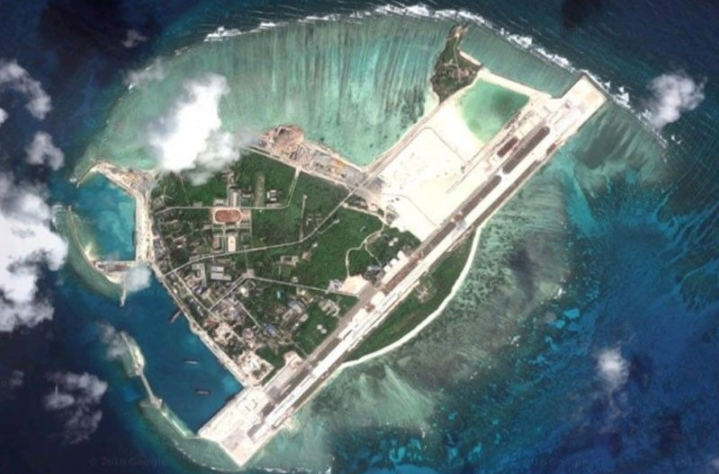 |
| China's artificial island on Bien Dong Sea (South China Sea) (Photo: Google Earth) |
France - UK - Germany's perspective
In its note, China emphasizes the mixed application of both Article 7, part II and Article 47, part IV, of UNCLOS on defining the baseline for the territorial sea in order to bring maximum benefit to this country.
France, UK and Germany has the opposite view. The three countries indicated that these two provisions above had conditions of application that were clearly defined in UNCLOS and couldnot be used overlapping.
China's argument is based on the 2018 study by the China International Law Association to refute the Bien Dong Sea ruling. This study cited 19 offshore archipelagos that applied a straight baseline. Of these, France, UK and Australia are all mentioned (France with the Kerguelen Islands; Guadeloupe and New Caledonia; Australia with Houtman Abrolhos Islands and Furneaux Group; UK with the Turks, Caicos Islands and the disputed Falkland Islands).
However, these mentioned countries that oppose China to apply the straight baseline of the archipelago to the Hoang Sa (Paracel) Islands and plan to apply further to the Nanhai archipelago. These countries' notes are evidence that there is no international practice in applying archipelagic straight baselines to the offshore islands of the coastal state as proposed by China.
 |
| An F/A-18E Super Hornet lands on the flight deck of the USS Ronald Reagan as the USS Nimitz sails alongside in the Bien Dong Sea (South China Sea) on July 6. (Photo: AP) |
The legal war has not yet come to an end
According to Vietnam's Ambassdor Nguyen Hong Thao, the "War of Notes" started with Malaysia in December 2019 and attracts the involvement of 10 nations with 23 notes and official letters (China - 8, Philippines - 2, Malaysia - 3, Vietnam - 3; Indonesia - 2, US - 1, Australia - 1, France - UK - Germany - 3).
Brunei and a number of other countries also issued statements demonstrating their stance. Most countries support the conclusions of the International Court of Justice's 2016 ruling that rejects the Chinas' claim of historic rights, and does not allow floating entities in the Truong Sa (Spratlys) to have a sea area larger than 12 nautical miles, does not to apply archipelagic baselines for the Truong Sa (Spratlys) as a unified unit.
More and more countries take a common stance, which may produce an erga omnes effect (applicable to all). China is still looking for new arguments to refute the Court's conclusions as well as to have a new interpretation of the provisions of UNCLOS. The legal battle in the Bien Dong Sea is not yet over, the Ambassador stated.
 | Storm Noul: two killed in central provinces, one hamlet isolated Storm Noul, which made landfall in central Vietnam on September 18 morning before devolving into a tropical depression, has left two dead in Nghe An ... |
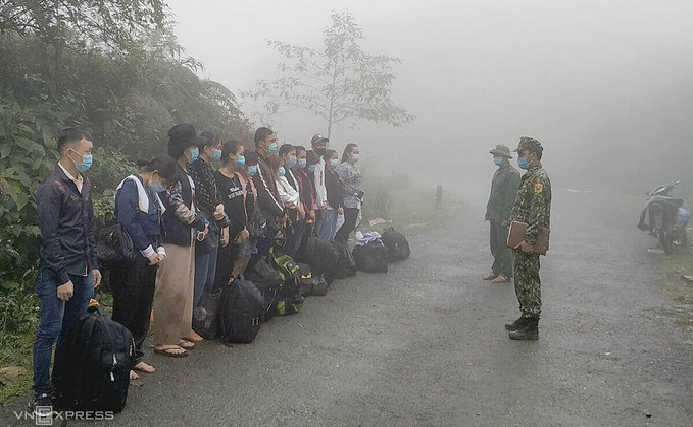 | Over 100 Vietnamese return home illegally from China As many as 107 Vietnamese were found illegally entering the country via northern Ha Giang province’s Meo Vac district that borders China from September 15-18, |
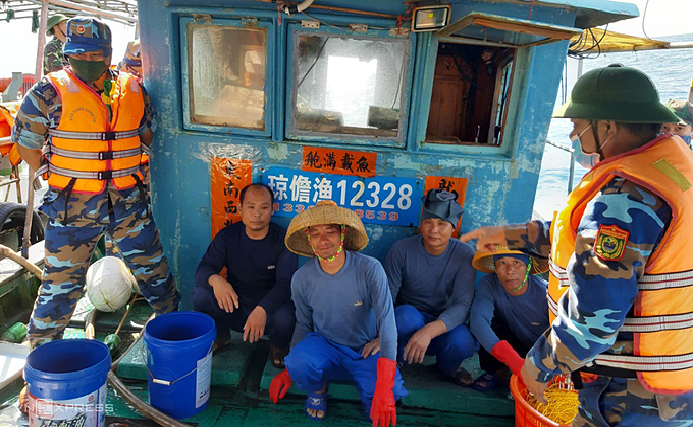 | Chinese vessels found fishing illegally in Vietnam’s waters Border guards in the northeastern province of Quang Ninh have found two Chinese fishing boats which were operating illegally in Vietnamese waters. |
Recommended
 Seas and islands
Seas and islands
Vietnam Endorses Common Voice on Ocean Jurisdiction
 Seas and islands
Seas and islands
Dialogue as Key to Settling Disputes and Advancing Law of the Sea
 Seas and islands
Seas and islands
RoK Navy Ship Pays Friendly Visit to Da Nang City
 Seas and islands
Seas and islands
Naval Region 5 Promotes Reading Culture, Fosters Patriotism
 Seas and islands
Seas and islands
Coast Guard Region 2 Command Hosts Philippine Coast Counterpart
 Seas and islands
Seas and islands
Vietnam - Thailand Navy: Coordination to Well Address Problems at Sea
 Seas and islands
Seas and islands
Honoring the Fallen: Incense Offering for the 37th Anniversary of Gac Ma
 Seas and islands
Seas and islands



